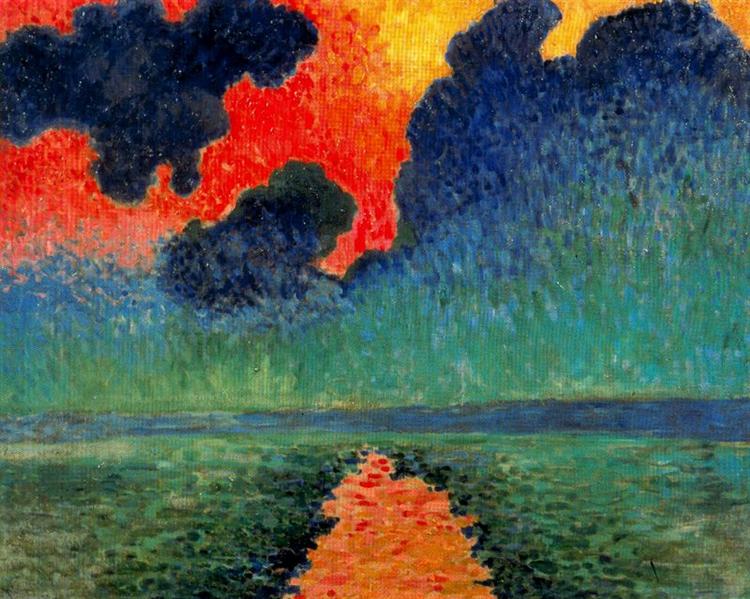FINIS (2)
By:
July 24, 2021

HiLoBooks is pleased to serialize Canadian author Frank L. Pollock’s 1906 proto-sf story “Finis” (also published as: “The Last Dawn”) for HILOBROW’s readers.
ALL INSTALLMENTS: 1 | 2 | 3 | 4 | 5.
The weight and distance of this new sun were approximately calculated, and, the speed of light being known, it was an easy matter to reckon when its rays would reach the earth.
It was then estimated that the approaching rays would arrive at the earth in twenty-six years, and that was twenty-six years ago. Three weeks had passed since the date when the new heavenly body was expected to become visible, and it had not yet appeared.
Popular interest had risen to a high pitch, stimulated by innumerable newspaper and magazine articles, and the streets were nightly thronged with excited crowds armed with opera-glasses and star maps, while at every corner a telescope man had planted his tripod instrument at a nickel a look.
Similar scenes were taking place in every civilized city on the globe.
It was generally supposed that the new luminary would appear in size about midway between Venus and the moon. Better informed persons expected something like the sun, and a syndicate of capitalists quietly leased large areas on the coast of Greenland in anticipation of a great rise in temperature and a northward movement in population.
Even the business situation was appreciably affected by the public uncertainty and excitement. There was a decline in stocks, and a minor religious sect boldly prophesied the end of the world.
“I’ve had enough of this,” said Davis, looking at his watch again. “Are you ready to go, Grace? By the way, isn’t it getting warmer?”
It had been a sharp February day, but the temperature was certainly rising. Water was dripping from the roofs, and from the icicles that fringed the window ledges, as if a warm wave had suddenly arrived.
“What’s that light?” suddenly asked Alice Wardour, who was lingering by the open window.
“It must be moonrise,” said Eastwood, though the illumination of the horizon was almost like daybreak.
Davis abandoned his intention of leaving, and they watched the east grow pale and flushed till at last a brilliant white disc heaved itself above the horizon.
It resembled the full moon, but as if trebled in lustre, and the streets grew almost as light as by day.
“Good heavens, that must be the new star, after all!” said Davis in an awed voice.
“No, it’s only the moon. This is the hour and minute for her rising,” answered Eastwood, who had grasped the cause of the phenomenon. “But the new sun must have appeared on the other side of the earth. Its light is what makes the moon so brilliant. It will rise here just as the sun does, no telling how soon. It must be brighter than was expected — and maybe hotter,” he added with a vague uneasiness.
“Isn’t it getting very warm in here?” said Mrs Davis, loosening her jacket. “Couldn’t you turn off some of the steam heat?”
Eastwood turned it all off, for, in spite of the open window, the room was really growing uncomfortably close. But the warmth appeared to come from without; it was like a warm spring evening, and the icicles were breaking loose from the cornices.
For half an hour they leaned from the windows with but desultory conversation, and below them the streets were black with people and whitened with upturned faces. The brilliant moon rose higher, and the mildness of the night sensibly increased.
It was after midnight when Eastwood first noticed the reddish flush tinging the clouds low in the east, and he pointed it out to his companions.
“That must be it at last,” he exclaimed, with a thrill of vibrating excitement at what he was going to see, a cosmic event unprecedented in intensity.
The brightness waxed rapidly.
“By Jove, see it redden!” Davis ejaculated. “It’s getting lighter than day — and hot! Whew!”
The whole eastern sky glowed with a deepening pink that extended half round the horizon. Sparrows chirped from the roofs, and it looked as if the disc of the unknown star might at any moment be expected to lift above the Atlantic, but it delayed long.
The heavens continued to burn with myriad hues, gathering at last to a fiery furnace glow on the skyline.
Mrs Davis suddenly screamed. An American flag blowing freely from its staff on the roof of the tall building had all at once burst into flame.
Low in the east lay a long streak of intense fire which broadened as they squinted with watering eyes. It was as if the edge of the world had been heated to whiteness.
RADIUM AGE PROTO-SF: “Radium Age” is Josh Glenn’s name for the nascent sf genre’s c. 1900–1935 era, a period which saw the discovery of radioactivity, i.e., the revelation that matter itself is constantly in movement — a fitting metaphor for the first decades of the 20th century, during which old scientific, religious, political, and social certainties were shattered. More info here.
SERIALIZED BY HILOBOOKS: James Parker’s Cocky the Fox | Annalee Newitz’s “The Great Oxygen Race” | Matthew Battles’s “Imago” | & many more original and reissued novels and stories.
